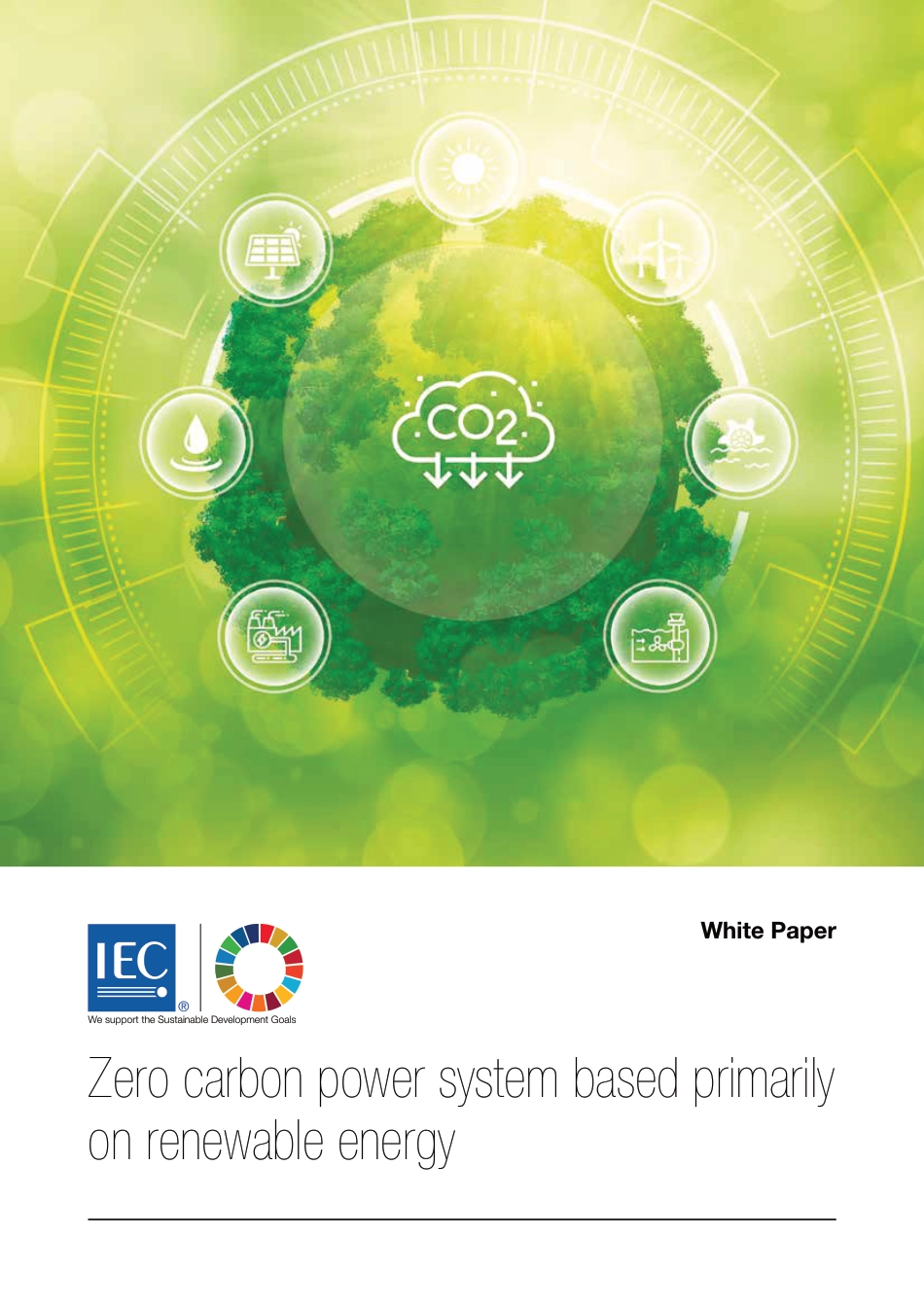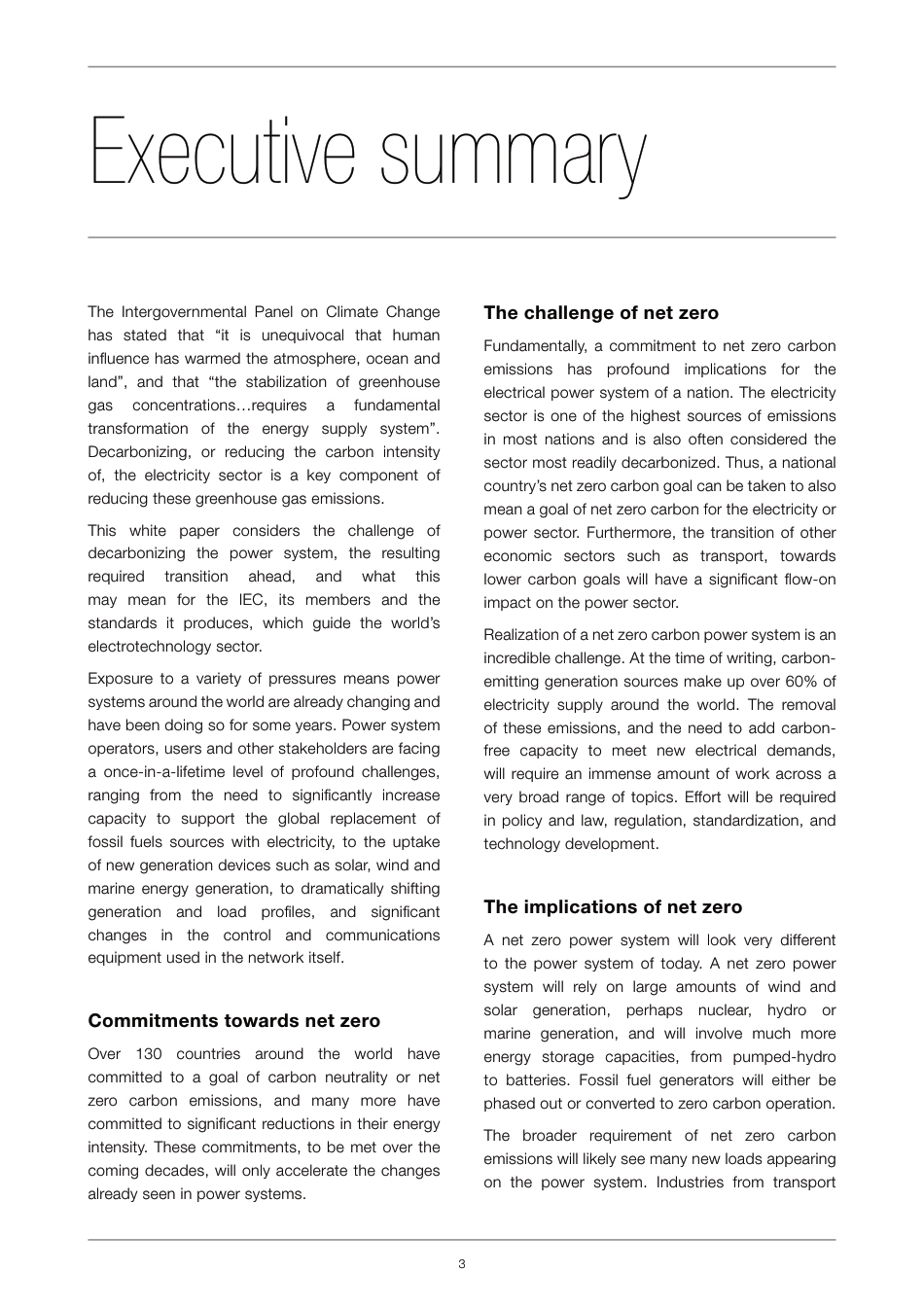ZerocarbonpowersystembasedprimarilyonrenewableenergyWhitePaperWesupporttheSustainableDevelopmentGoals3ExecutivesummaryTheIntergovernmentalPanelonClimateChangehasstatedthat“itisunequivocalthathumaninfluencehaswarmedtheatmosphere,oceanandland”,andthat“thestabilizationofgreenhousegasconcentrations…requiresafundamentaltransformationoftheenergysupplysystem”.Decarbonizing,orreducingthecarbonintensityof,theelectricitysectorisakeycomponentofreducingthesegreenhousegasemissions.Thiswhitepaperconsidersthechallengeofdecarbonizingthepowersystem,theresultingrequiredtransitionahead,andwhatthismaymeanfortheIEC,itsmembersandthestandardsitproduces,whichguidetheworld’selectrotechnologysector.Exposuretoavarietyofpressuresmeanspowersystemsaroundtheworldarealreadychangingandhavebeendoingsoforsomeyears.Powersystemoperators,usersandotherstakeholdersarefacingaonce-in-a-lifetimelevelofprofoundchallenges,rangingfromtheneedtosignificantlyincreasecapacitytosupporttheglobalreplacementoffossilfuelssourceswithelectricity,totheuptakeofnewgenerationdevicessuchassolar,windandmarineenergygeneration,todramaticallyshiftinggenerationandloadprofiles,andsignificantchangesinthecontrolandcommunicationsequipmentusedinthenetworkitself.CommitmentstowardsnetzeroOver130countriesaroundtheworldhavecommittedtoagoalofcarbonneutralityornetzerocarbonemissions,andmanymorehavecommittedtosignificantreductionsintheirenergyintensity.Thesecommitments,tobemetoverthecomingdecades,willonlyacceleratethechangesalreadyseeninpowersystems.ThechallengeofnetzeroFundamentally,acommitmenttonetzerocarbonemissionshasprofoundimplicationsfortheelectricalpowersystemofanation.Theelectricitysectorisoneofthehighestsourcesofemissionsinmostnationsandisalsooftenconsideredthesectormostreadilydecarbonized.Thus,anationalcountry’snetzerocarbongoalcanbetakentoalsomeanagoalofnetzerocarbonfortheelectricityorpowersector.Furthermore,thetransitionofothereconomicsectorssuchastransport,towardslowercarbongoalswillhaveasignificantflow-onimpactonthepowersector.Realizationofanetzerocarbonpowersystemisanincrediblechallenge.Atthetimeofwriting,carbon-emittinggenerationsourcesmakeupover60%ofelectricitysupplyaroundtheworld.Theremovaloftheseemissions,andtheneedtoaddcarbon-freecapacitytomeetnewelectricaldemands,willrequireanimmenseamountofworkacrossaverybroadrangeoftopics.Effortwillberequiredinpolicyandlaw,regulation,standardization,andtechnologydevelopment.TheimplicationsofnetzeroAnetzeropowersystemwilllookverydifferenttothepowersystemoftoday.Anetzeropowersystemwillrelyonlargeamountsofwindandsolargeneration,perhapsnuclear,hydroormarinegeneration,andwillinvolvemuchmoreenergystoragecapacities,frompumped-hydrotobatteries.Fossilfuelgeneratorswilleitherbephasedoutorconvertedtozerocarbonoperation.Thebroaderrequirementofnetzerocarbonemissionswilllikelyseemanynewloadsappearingonthepowersystem.Industriesfromtransport4Executivesummarytomanufacturingwillconvertfromfossil-fuelledequipment,suchasboilersorcombustionengines,toelectrically-drivenprocesses.Spaceheatingforhomesandbuildingswilltransitionawayfromfossilfuelstoelectricalheatingincludingtheuseofheatpumptechnology.Thesenewloadswilldramaticallyincreasedemandonthepowersystem–someestimateshavecountriessuchasCanadaneedingtomorethandoublesystemcapacityby2050.Ifmanagedcarefully,theincreaseindemandmayalsoassistwithpowersystemope...



 VIP
VIP VIP
VIP VIP
VIP VIP
VIP VIP
VIP VIP
VIP VIP
VIP VIP
VIP VIP
VIP VIP
VIP